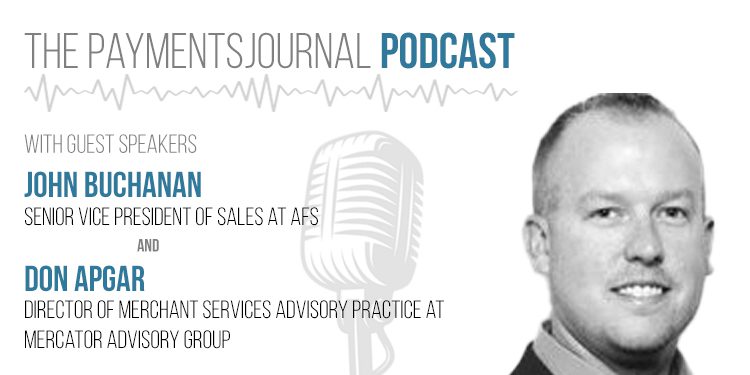Payment processing is an essential part of any business. Forward-thinking merchants are pursuing omnichannel experiences that will yield the highest number of conversions in the most efficient way. However, many merchants still rely on legacy payment processors. Software developers need to create the next generation of modern and agile payments processing technology to help merchants achieve their goals.
To learn more about why choosing an agile fintech payment processing partner is good for both merchants and software integrators, PaymentsJournal sat down with John Buchanan, Senior Vice President of Sales at AFS, and Don Apgar, Director of Merchant Services Advisory Practice at Mercator Advisory Group.
Modern software is difficult to integrate with legacy processing
One problem with legacy payment processors is their incompatibility with modern technology. “Legacy systems are often built with the original concept of payment processing in mind,” explained Buchanan. “We’re talking about any industry that has been around since the ‘60s and ‘70s.” Legacy platforms are often disjointed and extremely limited. Even with the onset of EMV chips, legacy platforms still relied on “dumb” terminals – plastic machines with rubber keys.
These days, customers have variable preferences for how and where they want to pay: curbside, in-line, at the table, etc. “Today’s solution must be omnichannel,” Buchanan continued. “Software developers need to build technology that enables merchants to meet their consumers where they are ready to transact.”
Unfortunately, the term “omnichannel” is sometimes misrepresented as simply having multiple payment processors. But if the various channels do not communicate with one another and consolidate payment data, those extra features will not add enough benefit to justify their inclusion. “You’ve got to make sure that it’s not just a legacy platform with a bunch of flashy collateral,” said Apgar. “It’s got to be built for a purpose.”
How to determine if a software provider partnership will work
For merchants hoping to partner with a new software provider, Buchanan listed several questions to ask to ensure an optimal choice:
- What will the merchant’s experience look like?
- What is the onboarding process?
- Do you get instant API credentials?
- Can you leverage existing hardware options to avoid PCI compliance issues?
- What additional payments functionality will you get?
- Split payments?
- Recurring billing?
- Inventory management control?
- Profitability reporting?
- Mobile wallet acceptance?
- Tokenization?
- Will the software link to a development portal with API documentation?
No matter what, software developers will need a direct line of communication to work through all the needs of their customers and their software. “A hands-on approach from an implementation perspective is equally as important as making sure that you are leveraging the right functionality and that you are building it in the most efficient way,” explained Buchanan.
Apgar further elaborated: “The biggest mistake that we’ve seen is that software developers will do a use-case analysis and say, ‘Okay, well, not everybody needs everything.’” Essentially, developers do not design their systems against potential future needs. “Even if you don’t need the feature, it’s important to make sure you connect to a platform that offers it, because you never know what tomorrow is going to bring,” Apgar continued.
The possibilities of an agile fintech payments processing partner
Payments processing is always going to be important, and upgrading payments processing systems is ultimately in any merchant’s best interest. Whether a merchant wants to monetize their payments or offer more pricing options, it is all about moving money. “It’s going to be inevitable that you’re going to have to ‘rip and replace’ a bit when considering the merchant’s perspective from the payment processing side,” noted Buchanan.
Merchants may feel hesitant to make such a wholesale shift because of the friction it will temporarily cause. “There is never a good time to rip and replace,” Apgar clarified. “But the longer you wait, the harder it gets, and at some point, you have no choice but to throw in the towel and start over because you just can’t iterate your platform anymore to add new features.”
Fortunately, specialized payments partners like Agile Financial Systems (AFS) can help. “Agility is the cornerstone of everything that we do [at AFS],” said Buchanan. “We built the APEX platform with an emphasis on our ability to remain agile, creating custom solutions for merchants across a multitude of demographics.” The APEX platform offers innovative financial solutions that fit the payments landscape of today and tomorrow, providing efficiency and improved payments experience across the board.
“Customers are shopping in more ways than they ever have before,” Buchanan concluded. “It is critical that merchants are meeting their customers at their preferred point of purchase, without sacrificing efficiencies, customer experience, customer conversion rates, or other merchant processes in general. When customers are ready to buy, our merchants need to be there to meet them.”
